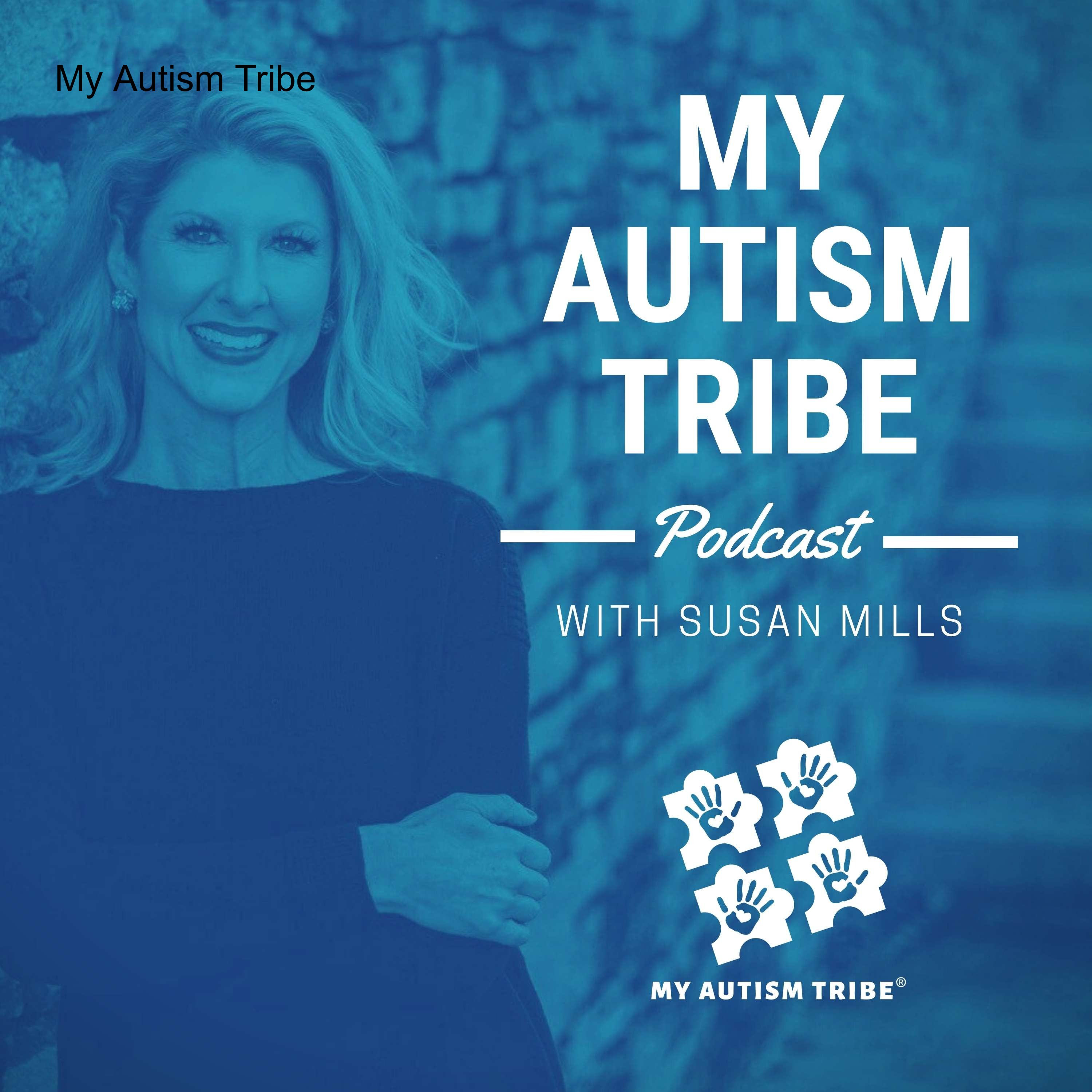Episodes
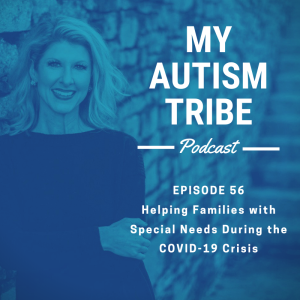
Tuesday Mar 24, 2020
Helping Families with Special Needs During the COVID-19 Crisis
Tuesday Mar 24, 2020
Tuesday Mar 24, 2020
EPISODE 56: Helping Families with Special Needs During the COVID-19 Crisis
With Amy Kelly
INTRO:
As we all are very much aware, COVID-19 is affecting everyone’s lives around the world. COVID-19 is a new strain that was discovered in 2019, and has not been previously identified in humans. There is so much information out there; some is factual and some is misleading. This leaves us with a lot of questions, but I believe it’s important to speak on how it might be affecting the autism community specifically. How do we help families who live with autism and disabilities? How do we help them cope with everything during this trying time? How do we explain this current situation to our children? Stay tuned to listen to today’s guest as she offers some insightful information that may benefit you and your family.
SEGMENT:
Today’s guest is Amy Kelly. She’s the mother to Danny, Annie, and Ryan. Her daughter Annie is diagnosed with moderate to severe autism, verbal apraxia, intellectual and developmental disabilities, and general anxiety disorder. Amy is the National Director of Family Engagement for Devereaux Advanced Behavioral Health, one of the nation’s oldest and largest nonprofit providers of behavioral healthcare, and she also serves as a family representative on several special-needs boards in the community, locally and nationally. In addition to all of this, she participates with other patients and families in efforts supported by the American Board of Pediatrics Foundation to address children with special needs and the importance of quality care. She’s quite the busy lady, and sounds like she’s gonna to be able to share some really good stuff with us. Let’s welcome Amy!
CONCLUSION:
Please know that I’m thinking about everyone out there. I’m lifting you up, sending virtual hugs, high-fives, fist bumps…you name it. Now more than ever we have to be in this together. It’s an emotional time for everyone, and I do hope that if you need someone to listen that you please reach out. Send me a message on any of our social platforms, send me an email. I want to make sure that all platforms are open and available to you. If I can’t personally assist you, I’ll make sure that I find someone that can. You’re not alone. You never have been, nor will you ever be. Thanks so much for being a part of My Autism Tribe. Hang in there, and I’ll see you next week!
ADDITIONAL INFORMATION:
Facebook – https://www.facebook.com/DevCareers
LinkedIn – https://www.linkedin.com/company/devereux/
Twitter – https://twitter.com/DevereuxCEO
YouTube – https://www.youtube.com/channel/UCrF_lQGwNvQHuqQ7xcSE0Gg
About Devereux Advanced Behavioral Health
https://www.devereux.org/site/SPageServer/?pagename=helping_families
Devereux Advanced Behavioral Health is one of the largest and most advanced behavioral healthcare organizations in the country. They have a unique model that connects the latest scientific and medical advancements to practical, effective interventions in the treatment of behavioral health.
They were founded in 1912 by one of the first pioneers in the field, Helena Devereux. Today, they are a national nonprofit partner for individuals, families, schools and communities, serving many of the most vulnerable members of our society in areas of autism, intellectual and developmental disabilities, specialty mental health, and child welfare.
Informed by the latest advancements in science and medicine, they combine evidence-based interventions with compassionate family engagement to help change lives. Their programs are offered in hospital and residential, community, and school-based settings.
They include:
- Comprehensive Assessment, Diagnostics and Measurement to support data-driven care
- Evidence-based Treatment & Special Education
- Transition and Independent Life Services
- Family Education and Professional Training
- Research and Innovation to advance the field
- Advocacy, Public Awareness and Prevention

Monday Mar 09, 2020
Pixar's Bobby Rubio Shares His Autism Dad Story in "Float"
Monday Mar 09, 2020
Monday Mar 09, 2020
EPISODE 55: PIXAR’S BOBBY RUBIO SHARES HIS AUTISM DAD STORY IN “FLOAT”
INTRO:
Hi, everyone! Welcome to this week’s episode with a very special guest, Bobby Rubio, an autism dad and a story artist at Pixar. You may have seen his personal and professional story in thousands of news feeds around the world. You don’t want to miss this one! Also, if you’re enjoying being a part of My Autism Tribe, and listening to our podcast, we would love for you to take a moment to rate and review us wherever you listen to podcasts, and of course, share us with a friend or your organization. That’s how we make our voices stronger. We’re also on all social platforms, so give us a follow and send us a message about topics that you would like to hear about. It’s important to us that we’re providing you with information and messages that are near and dear to your heart. Thanks for listening!
SEGMENT:
When parents first receive an autism diagnosis, and even in moments afterwards, they may feel like they’re drowning…and they’re not alone. Many of us may feel like this, but our guest today has created a special animation that touches every parent, and sheds a light on the positivity that can be found in dark times.
Bobby Rubio made his directorial debut with Pixar’s animated short “Float” on Disney Plus in November and it has captured our hearts and told many of our stories. Bobby has worked at Pixar as a story artist since 2012, contributing to “Inside Out”, “Incredibles 2”, and “Brave”, but “Float” broke through barriers as not only a short focused on neurodiversity, but also Pixar’s first work to feature a Filipino American animated character. The short tells the story of a father that discovers his son is different than others, and rather have the outside world view him as being different, the father keeps his son out of sight. Bobby’s own son, who was diagnosed with autism, didn’t handle the news of his son’s diagnosis well…again…just like many of us, and his testimony is so heart-felt and inspiring. Please welcome, my special guest today, Bobby Rubio.
CONCLUSION:
The story behind “Float” is not only a story that autism parents can relate to, but about some of the struggles that every parent has with their children. We need to love and celebrate people from all walks of life. Being unique or different isn’t bad, but beautiful. I truly do believe that, and it’s my hope that Bobby’s story touched you in the way that it touched me. The way that it inspired me. It’s ok to step outside of your comfort zone, and embrace the unknown. Thanks so much for joining me today, for being a part of My Autism Tribe, and for being an advocate for yourself and others. I’ll see you next week!
ADDITIONAL INFORMATION FOR BOBBY:
Instagram: https://www.instagram.com/bobbyrubio/
Facebook: https://www.facebook.com/barrypresh
Twitter: https://twitter.com/Bobby_Rubio
Disney Plus: https://www.disneyplus.com/
“Float” on Disney Plus: https://www.disneyplus.com/movies/float/7dIYGyfvHWEJ

Monday Mar 02, 2020
Financial Planning for Your Special Needs Child
Monday Mar 02, 2020
Monday Mar 02, 2020
EPISODE 54: Financial Planning for Your Special Needs Child
With Nick Wallace
INTRO:
Raising a child with special needs can be one of life’s most fulfilling experiences, but it can also be one of the most costly. According to Autism Speaks, raising a child with autism costs on average $60,000 a year, but let’s face it…it costs a lot more than that for a lot of us depending on the severity and insurance coverage. It can be scary looking at the financial numbers, and even scarier when you wonder what would happen if something happened to you. Long-term financial planning is daunting, but no matter your child’s age, it’s important for you to start as early as possible.
Today, I’m speaking with Nick Wallace, a financial planner that focuses on planning for families in the special-needs community. His passion for this type of planning is inspired by the feeling of relief that he experienced after working through a game plan for his brother’s future, who has special needs. Nick is going to share some insights from the daily conversations that he has with families and planning for their loved ones.
CONCLUSION:
The process for financial planning for a special-needs loved one takes time, but you can start by laying out a timeline for what needs to be done.
Plan early, and revise as needed. It’s not easy or straightforward, and what makes sense for one family may not make sense for another. Get help. It’s doable.
Thanks so much for being a part of My Autism Tribe, and I’ll see ya next week!
ADDITIONAL INFORMATION
TOOLS THAT ARE OFTEN USED:
- Various types of special needs trusts (with the help of a special needs attorney)
- ABLE accounts (when appropriate if allowed by the state)
- Various types of life insurance to answer the tomorrow questions or the 40 years from now questions
- Various types of investments for retirement and estate planning
QUESTIONS TO ASK YOUR FINANCIAL PLANNER:
- Did we take into consideration my loved one’s special needs when we established my insurance and investment game plan?
- Do I have enough life insurance to protect the care and income that I provide my family if something were to happen to me tomorrow? How did we arrive at this number?
- What steps can I take to make sure that I am on track for retirement? How did we come up with these numbers?
- Are my beneficiary designations on my life insurance and investment accounts set correctly so that my loved one with special needs’ benefits will not be in jeopardy?
- What is the long-term game plan on leaving behind money for my loved one if I live a long life of caring for them, but pass away before they do?
- A solid financial plan has answers for the “what-ifs” that life could throw at us tomorrow or 60 years from now. Nick recommends meeting with a financial advisor at least yearly to review plans and make changes if necessary.
NICK WALLACE CONTACT INFORMATION:
Facebook - @nickwallacefinance
Website – www.nickwallace.nm.com
Email – nick.wallace@nm.com
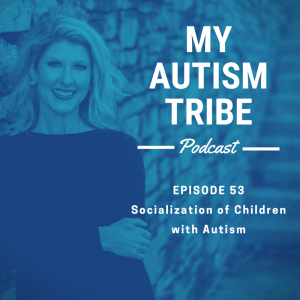
Monday Feb 24, 2020
Socialization of Children with Autism
Monday Feb 24, 2020
Monday Feb 24, 2020
EPISODE 53: SOCIALIZATION OF CHILDREN WITH AUTISM
With Dr. Annette Nunez
INTRO:
Hi, everyone! Welcome to this week’s episode primarily focusing on mainstreaming and socialization of children with autism. I’m speaking with Dr. Annette Nunez, the founder and director of Breakthrough Interventions. You may have even seen her on FOX News as she does many interviews on the power of positivity and autism. Stay tuned to listen to this awesome lady share her experience and advice on cultivating positive relationships through facilitated play and much more.
Also, a friendly reminder that if you’re enjoying the podcast, I would love for you to take just a minute to rate and review wherever you listen to podcasts and share with a friend. That’s how we make our voices stronger. Thanks for listening!
SEGMENT:
Dr. Annette Nunez conducts many seminars both nationally and internationally, in addition to consulting with schools in China and South Africa on autism interventions. She is a licensed psychotherapist and has worked with children on the spectrum and other related disorders for over 20 years. She has a B.A. in Psychology, a Masters in Marriage and Family Therapy, and a Ph.D. in Quantitative Research Methods with a specialization in Child Development. She loves working with the whole family, so much so that she created an online community called Breaking Through Autism where she shares support and self-care tips. We all know that every journey looks different, but it’s the support system that you need to help guide, inspire and encourage you along the way. That’s what keeps EVERYONE moving forward. I’m really excited to introduce Dr. Annette Nunez to our show today.
CONCLUSION:
As Dr. Nunez has stated, “Success for me is not what I can do for your child. Success is when parents trust and support the process no matter how hard it can be. Success is when I have the privilege to watch my clients realize their full potential and have a positive outlook on life and their future.” Rather than focusing on the negatives that you may hear, “your child will never, can’t, etc.”, try focusing on the positives. Thanks so much for being a part of My Autism Tribe, and I hope to see you next week.
ADDITIONAL INFORMATION:
Dr. Annette Nunez Bio
Dr. Annette Nunez is the founder and director of Breakthrough Interventions, LLC. She is a licensed psychotherapist and has worked with children with ASD and other related disorders for over 20 years. She received a B.A. in Psychology, an M.S. in Marriage and Family Therapy and a Ph.D. in Quantitative Research Methods with a specialization in Child Development. At UCLA, she studied and trained with renowned autism expert, Dr. Ivar Lovaas on Discrete Trial Training (DTT). She also received training from the Institute for Child Development in California on the Floortime Approach and developed a successful behavioral program that combined aspects of DTT and Floortime.
As part of her doctorate work at the University of Denver, Dr. Nunez developed the Children’s Social Competence Scale (CSCS). The CSCS is an early intervention evaluation tool that measures social competency in young children. She serves as the Program Director for Connect Us, a non-profit organization that helps children cultivate positive relationships through facilitated play. Her research interests include the mainstreaming and socialization of children with High Functioning Autism.
Dr. Nunez co-wrote the Friendship Is… book and is currently writing a book about the Breakthrough Interventions model that will be published this year. She conducts many seminars both nationally and internationally and has consulted with many schools in China and South Africa. Dr. Nunez also consults and supervises the therapists at the Breakthrough Interventions site in South Africa.
Dr. Nunez was honored by the Autism Society of Colorado as a finalist for the 2011 Faces of Autism Professional Award. You can see Dr. Nunez on FOX News as she as she does many interviews on the power of positivity and autism. She plans to continue educating parents and professionals about mainstreaming and socialization of children with Autism.
Facebook: https://www.facebook.com/BreakthroughInterventionsLLC/
Instagram: https://www.instagram.com/breakthrough_autism/
Twitter: https://twitter.com/BTInterventions
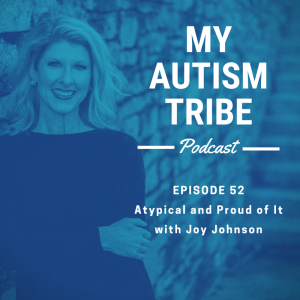
Monday Feb 17, 2020
Atypical and Proud of It
Monday Feb 17, 2020
Monday Feb 17, 2020
EPISODE 52: ATYPICAL AND PROUD OF IT
With Joy Johnson
INTRO:
Hi there! Welcome to this week’s podcast episode “Atypical and Proud of It”. I’m really excited to be speaking with behavioral therapist Joy Johnson who is also on the spectrum herself. I fell in love with her Instagram page because she is just super honest, and let’s be real…what better way to learn about neurodiversity than from someone that is on the spectrum. I hope you enjoy!
Also, make sure that you’re following My Autism Tribe on our social platforms, Facebook, Instagram, Twitter and also YouTube. Let’s make our voices stronger.
SEGMENT:
Joy Johnson is an autism advocate, behavior and inclusion specialist, and is on the spectrum. She uses her social platform to not only share her thoughts on everyday life, but also her thoughts on some of the more popular autism research and science. It’s such a joy to welcome Joy Johnson to our show today!
CONCLUSION:
In the past, our traditional expert knowledge came from observations by professionals who often lacked the personal experience of being autistic, but by listening to autism advocates that are on the spectrum, we can gain a larger understanding and acceptance of autism. One might even say that those on the spectrum are the true experts, right? Thanks for listening to this week’s episode, and thanks for being a part of My Autism Tribe. I’ll see ya next week!
ADDITIONAL INFORMATION:
Instagram: https://www.instagram.com/joyfjohnson/

Monday Feb 10, 2020
An Autism Dad's Field Guide
Monday Feb 10, 2020
Monday Feb 10, 2020
EPISODE 51: AN AUTISM DAD’S FIELD GUIDE
With Tim Gonzalez-Smith
INTRO:
Hi there! Welcome to My Autism Tribe! Today I’m speaking with an autism dad, Tim. So often times, we are listening to the voices of mothers to children on the spectrum, but Tim is going to share all about his journey with his son, Rafa, and how he is educating and supporting the autism community from a dad’s perspective. Keep listening – he’s awesome!
And, if you’ve been enjoying this podcast, I would love it if you could rate and review us wherever you listen to podcasts and share with a friend. It helps make our voices stronger.
SEGMENT:
I started following Tim through his Instagram account @autismdads, because a dad’s perspective is just as important as a mother’s when raising a child on the spectrum. Tim knew this and wanted to connect with the autism community. Along the way he has provided support for so many people, and has also learned so much from others, which he shares with us. He has struggled with anxiety, just like a lot of us, and is such an awesome advocate for his son. Please welcome Tim.
CONCLUSION:
To all the dads out there that are traveling on this autism journey, thank you for everything that you do. We see you! You are a very important member of our Autism Tribe. Thanks for joining me this week, and thanks for being a part of My Autism Tribe. I’ll see ya next week!
ADDITIONAL INFORMATION
INSTAGRAM: https://www.instagram.com/autismdads/
BOOKS:
“The Autism Field Guide” – A book to help parents of newly diagnosed kids use empathy and understand as a way to support & empower.
“8 Ways to Support an Autistic Child and Improve Yourself” on the www.theautismfieldguide.com
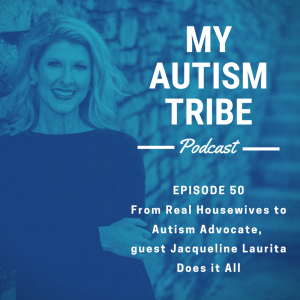
Monday Feb 03, 2020
Monday Feb 03, 2020
EPISODE 50: FROM REAL HOUSEWIVES TO AUTISM ADVOCACY, JACQUELINE LAURITA DOES IT ALL
INTRO:
Hi, everyone! You are in for a special treat today. Today’s guest is none other than autism mom advocate extraordinaire and reality tv celebrity, Jacqueline Laurita. She was on Bravo TV’s “The Real Housewives of New Jersey” for seven seasons, and during this time her adorable son Nicholas received his autism diagnosis. She’s gonna share all about that, so stay tuned. You definitely don’t want to miss it.
Also, you may have seen, the My Autism Tribe podcast and nonprofit organization just recently celebrated our one-year birthday. That’s one year of successes, one year of challenges, and one year of getting to know each of you. Thank you for coming along on this journey with me, and for listening to this podcast! Your support means the world.
SEGMENT:
Jacqueline’s son Nicholas was diagnosed with autism in 2012 at the age of three, and since this time Jacqueline has become a leading advocate in campaigns for increasing autism awareness. She’s a female powerhouse with a mama bear’s love for her family. I’m so excited to introduce to you, Jacqueline Laurita.
CONCLUSION:
Whether you are a regular on a TV reality show, a teacher, a service provider, a stay-at-home mom, ALL of our voices are absolutely necessary in spreading autism awareness and acceptance in our communities. Maybe your platform is social media, or being a part of your child’s PTA. Don’t be afraid to make your voice stronger. Thanks so much to Jacqueline for her time and willingness to share her family’s story with us, and thanks so much to you for listening. You are an amazing member of My Autism Tribe, and without you none of this would be possible. I’ll see ya next week!
QUESTIONS ANSWERED DURING PODCAST:
- Can you tell us more about the diagnosis story- who, what where when and how-
- What have been some of the biggest challenges you and your family have faced?
- Let’s talk about advocating and awareness- what recent work have you done that has helped with awareness?
- With all the many projects you have going on and caring for your family how do you like to unwind and relieve stress?
- What words of advice would you tell the person you were 10 years ago?
- Can you share a story of success in your journey?
- Tell us more about Simple Spectrum and why you’re so passionate about this company?
- Can you tell us more about your nutrition background and why you got into this?
- Why do you think Simple Spectrum is so different than most supplements out there?
- Can you tell us the difference that nutrition and supplements have made for you guys? Gluten free/ casein free diets?
- Do you miss being on the housewives? Any chance you will do it again?
- Can you tell us more about The Lookover Ladies podcast? How’s that been going?
ADDITIONAL INFORMATION FOR JACQUELINE
Facebook: https://www.facebook.com/jacquelinelaurita/
Instagram: https://www.instagram.com/jaclaurita/
Twitter: https://twitter.com/JacLaurita
Podcast: https://podcasts.apple.com/us/podcast/the-lookover-ladies/id1479048850
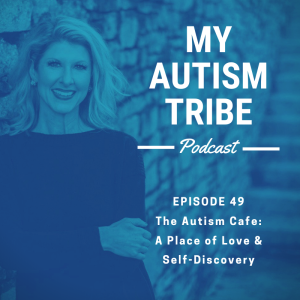
Monday Jan 27, 2020
The Autism Cafe: A Place of Love and Self-Discovery
Monday Jan 27, 2020
Monday Jan 27, 2020
EPISODE 49: THE AUTISM CAFÉ – A PLACE OF LOVE AND SELF-DISCOVERY
With Eileen Lamb
INTRO:
Hey, guys! Welcome to the My Autism Tribe podcast! If this is your first time, I’m glad you found us, and if you’ve been listening – welcome back! Today I’m speaking with Eileen Lamb. She’s the founder of blog The Autism Cafe, and she is also a writer and photographer. Born in France, she now lives in Austin, Texas with her husband and two sons, Charlie (6) and Jude (3). On her blog, she shares the ups and downs of raising a severely autistic child while being on the autism spectrum herself. You’re not gonna want to miss this one. I’m really excited to have her on the show today.
Also, don’t forget to check us out on social media. That’s Facebook, Instagram, Twitter and YouTube. It’s My Autism Tribe across the board, so find us, follow us, join our tribe. We’d love to have you!
SEGMENT:
Before we start our interview, I’d like to share with you a quote from our guest today. You can find this on her blog The Autism Café: “Dear Strong Woman: You don’t show your pain because you heard that to be vulnerable is to be weak, that crying is a flaw, and that you need to get back up as soon as you fall. Yet you don’t. I’m here to tell you that it’s okay if you can’t. Strength is finding the courage to speak up in a world that has been cruel to you. Strength is letting people in, no matter how many times you’ve been hurt before. Strength is being able to say, “I’m not okay right now. I need you.” Those are such powerful words, right? I’m so happy to welcome Eileen to our show.
CONCLUSION:
Eileen’s unique story, coupled with her absolutely stunning photography, is an inspiration and tribute to all who overcome the impossible and persevere for those they love. There are so many people out there that are, for whatever reason, traveling on this journey alone…but it doesn’t have to be that way. I hope you, and others, find relief in knowing that there are a lot of us traveling the same road and you don’t have to travel alone. As Eileen points out, road trips can be fun – why not join others. We are not alone. Thanks for being a part of My Autism Tribe and I’ll see ya next week!
ADDITIONAL INFORMATION:
Facebook: https://www.facebook.com/theautismcafe/
Instagram: https://www.instagram.com/theautismcafe/
Twitter: https://twitter.com/theautismcafe
Get a hardback copy here: All Across The Spectum
Get the Kindle version here: AATS on Amazon
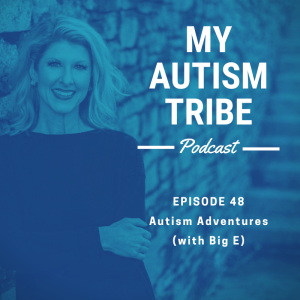
Monday Jan 20, 2020
Autism Adventures (with Big E)
Monday Jan 20, 2020
Monday Jan 20, 2020
EPISODE 48: AUTISM ADVENTURES (WITH BIG E)
With Jacqui Folks
INTRO:
Hi there! Thanks for joining me today. I’m speaking with a busy mother of three young men, Jacqui Folks. Her middle son, Ethan, has autism, and she’s going to share her family’s story, along with some resources that she has been working on for the autism community.
I also want to let you know that this week will mark the one-year anniversary for the My Autism Tribe podcast. It seems like yesterday that I started it, but it’s been a whirlwind and here I am one year later…still breathing…high five!
If you haven’t had a chance to rate or review the My Autism Tribe podcast, it would absolutely be cool if you did. It helps people find our podcast – especially on Apple Podcasts. Thanks for listening, as always, and for going on this crazy journey with me. You’re the best!
SEGMENT:
Jacqui Folks son was diagnosed in 2003, a time when there were little resources out there for parents. Think about all the resources that we have now, including podcasts! She learned almost everything from books, but there was also something that she felt that was missing. I’m excited for her to share what that was. Please welcome Jacqui Folks.
CONCLUSION:
I love hearing inspirational stories from those in the autism community. We are a group of fighters ya know, and I mean that in a good way. A bunch of mama and papa bears, and fearless advocates, both on and off the spectrum that are clawing our way for better awareness and inclusion in our communities. It’s so awesome. Thanks for being a part of My Autism Tribe, and I’ll see ya next week!
JACQUI’S BIO:
When my son was diagnosed in 2003 there were little to no resources out there for parents. I learned almost everything I know from books. However, there were no children’s books I could share with him for his learning experience. It was always suggested to me to write social stories, and I did, but nothing is more catching than a good children’s book.
Over the years I have kept them and my dream was to have a series of Autism friendly books, with a main character who has Autism, for spectrum kids to listen and learn from. Well, my dream is coming true. Book one in our series is here!! These stories are something I longed for as I was raising my son. They would have been so helpful to just pick up and read before each life event. I would have used them daily at home, in the community and in the classroom. I feel confident that they can help others in the future.
Here are a few reasons why:
-Simple, short, direct and honest text that is actually used in the home.
-Reference to visuals, picture boards
-The same returning character with a simple and fun name.
-The same start and end to each book, no matter how different the story or message is. Repetition is key!
-There are several stories about Autism but very few series. In my research I only found two and they were short series not based on daily life skills.
-My series does help with daily life skills but with fun illustrations and a relatable, adorable, supportive main character.
-A lot of parents and educators do not know how to access or write social stories. Why not provide them for these families and educators?
Awarded a top book of 2019 by Autism Live and featured in their 2019 Holiday Toy & Gift Guide:
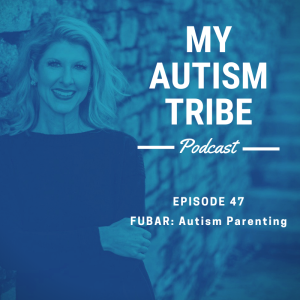
Monday Jan 13, 2020
FUBAR: Autism Parenting
Monday Jan 13, 2020
Monday Jan 13, 2020
EPISODE 47: FUBAR: Autism Parenting
With Jessica Temple
INTRO:
If you spend just one minute on Google searching for parenting memes, you’ll be inundated with hilarious quotes and pictures on how to survive parenthood. It’s something that us parents get a few good laughs from, while we’re silently screaming inside. How many times have we questioned ourselves, “Will I get through this?”.
My guest today, Jessica Temple, is the creator of a podcast called FUBAR: Surviving Parenthood with Special Needs Kids, and is also a board-certified clinical neuropsychologist. Her podcast is all about creating a non-judgmental space to realize that we all actually WILL live through this, and offer tips on making the survival of parenthood an actual possibility. It’s hilarious. Jessica and her husband have two children with special needs. Their oldest has autism, ADHD, sensory processing disorder, and developmental delays, and their youngest child had a perinatal stroke and has developmental delays. It’s a complete joy to welcome Jessica to our show today.
CONCLUSION:
There’s no perfect way of parenting, and as Jessica points out, there are always “fails”, “nails”, and “comical tales” along our journeys. Learn to embrace them, and know you are not alone. We’re all in it together. Thanks for joining me on my journey, and thanks for being a part of My Autism Tribe. See ya next week!
Additional information:
Website: www.fubarpod.com
Twitter: https://twitter.com/fubarpod
Facebook: https://www.facebook.com/groups/fubarpod
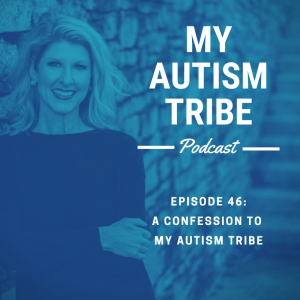
Monday Jan 06, 2020
A Confession to My Autism Tribe
Monday Jan 06, 2020
Monday Jan 06, 2020
EPISODE 46: A Confession to My Autism Tribe
with Susan Scott
INTRO:
Hi, everyone, Happy New Year! I hope you had an amazing send off to 2019.
I announced last November that I was taking a podcast break, so I thought it would be fitting to have the first podcast of 2020 be a confession to you on why this happened. It’s a bit uncomfortable to share, but you deserve to know so stay tuned.
Also, a reminder, if you’re enjoying this podcast, please rate and review us wherever you listen to podcasts, and share with a friend. That’s how we make our voice stronger. Thanks so much for listening!
SEGMENT:
- I haven’t always been completely honest with myself and others. When people have asked me if I was ok, I would say, “I’m great!” because let’s face it, do people really want to know what kind of crappy day that you’re having when they ask you that question? I’ve even looked in the mirror and told myself that things were moving along quite smoothly, and things were looking up…when in fact, I felt like I was drowning. Perhaps a part of me was trying to “fake it ‘til I made it”.
- In November of last year (2019), when I announced that I was taking a break in December, it was from complete and utter burnout. The kind of physical, mental and emotional burnout that left me feeling scatterbrained (beyond normal), dazed, not willing to make an effort of everyday duties like laundry, etc. But even worse than that, I felt myself disconnecting from my son. I was in my own world. That’s when I realized that taking a break was absolutely, without a doubt, imperative.
- My Autism Tribe was formed initially as a standalone podcast, but then added a nonprofit component. This has proven to be one of the hardest challenges in my life. In 2019, I very literally poured every ounce of energy that I had (after caring and loving on my son) into this organization and podcast. I’ve had some event successes, and other events that have fallen flat on their faces. I don’t have an administration team helping me every day. It’s 99.9% me. I don’t have a significant other that can offer encouragement when I’ve had a bad day, and I know that many of you are in the same situation. It’s tough to keep all the plates spinning and still feel sane, am I right? But I’m not sharing this stuff with you for sympathy. I’m sharing because I want you to know about how some of my viewpoints have changed.
- In the month of December, I did a lot of thinking, a lot of reflecting, a lot of praying, and I’ve decided that I’m going to change things up a bit. Let me explain.
- Up until now, I’ve intentionally kept the My Autism Tribe social platforms very “branded”, if you will. I felt like this was a direction that I needed to originally go to establish the My Autism Tribe name, but upon reflection, it completely defeats the purpose of why I started My Autism Tribe to begin with. I wanted to reach people on a very human level, and I’ve done that to some extent through the podcast, but my promise to you is that I start letting you in to my personal life more. I’m always asking guests and followers to share their stories, but what about mine? At first, I thought, “Why in the world would anyone want to see my everyday life”, but then I realized that this is the very thing that I gravitate towards when I’m searching for connection with others. I can’t promise that you still won’t see branded content, because I still very much believe it’s important as a nonprofit, but I can promise you that I will be sharing more of my family. It’s going to feel weird initially, because I’ve never been one to share details of my life with just anyone, and there are some details that I will still hold close to my chest that are just too personal to share and may involve others, but well, welcome to my family’s life. I apologize in advance (laugh).
- The same goes for the podcast. It is still my mission, and always will be, to have guests that are all uniquely tied to the autism community. Parents, siblings, relatives, providers, and most importantly self-advocates. That won’t change. I will, however, be doing some smaller “snapshot” episodes now and again that will have the theme “Just Ask”. These episodes will feature talking points or questions that have come from people like yourself, in the autism community, followers, etc. This is another way that I feel like I can not only connect each of you through this platform, but also connect on a deeper, more personal level. So, be looking for some of these prompts on the social platforms.
- I’ll also be trying to do more videos, both personally and professionally, meaning that some will look like complete poo. The other videos will probably look a bit more polished, and those will more than likely be branded to some extent for the nonprofit’s use and distribution.
- They always say that the best way to grow is the learn from your mistakes, failures, detours, and 2019 has had them. BUT, it was the first year, and I believe there were a lot of successes as well. I’ve met so many absolutely, incredible, inspirational, beautiful people this year, and I know that this year (2020) will be filled with the same. Constantly evolving, forever growing, and learning.
- I’m SUPER excited to announce some BIGGER things that are in the works for 2020.
- #1 – I’ve been writing a children’s book series this last year, and they will be (fingers crossed) pushing into illustration within the next month or so. These books will be for children both on and off the spectrum, providing a window and a mirror to autism. A mirror for children that are on the spectrum – allowing them to see the beauty of their differences, and a window for children that are not on the spectrum – allowing them to look into the world of someone that IS on the spectrum. These books began by me writing a story for my son to explain that his differences weren’t bad but beautiful, during a time that I felt like he was beginning to become more aware that he had differences. Each book will contain consistent and fun characters that children are able to closely relate to.
- #2 – I’ve been working closely with a group of real estate developers and another organization to push for the development of an autism residential community where I live. This community will provide residential options and programs for those on the spectrum. We are nowhere close to breaking ground, but I wanted to share this with you, because it’s something that I’m very proud of, and excited about for our community. I’ll continue to update you as I have more details.
- All in all, I want to thank each of you for listening to the My Autism Tribe podcast, and being patient with me as I continue to navigate this crazy journey both professionally and personally. It’s something that I’m so passionate about, and I want to continue to educate, encourage and inspire others…just as so many people have done that for me.
- Here’s looking to a bright 2020, with a vision of hope for our ourselves and our loved ones. I love each and every one of you. Thank you for being a part of My Autism Tribe.
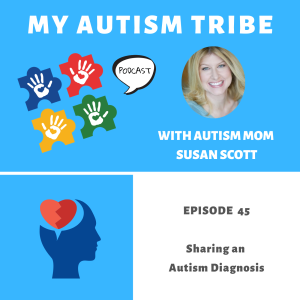
Monday Dec 02, 2019
Sharing an Autism Diagnosis
Monday Dec 02, 2019
Monday Dec 02, 2019
EPISODE 45: SHARING AN AUTISM DIAGNOSIS
INTRO:
Hello, Friends! Thanks for joining me. This is the last podcast for the 2019 season. I want to take this time to thank each and every one of you for an amazing ride in 2019 – the first official year of this podcast and the My Autism Tribe nonprofit organization. I’m really excited about all of the advocacy plans that we already have for 2020…I’ll give you a hint on a couple: plans for a residential autism community, and an entire children’s book series. Buckle up for a wild and exciting year. As we finish out this year, I thought it would be fitting to take a podcast break before we start our second season. This time is going to be used to soak in every minute with family during the holidays. I want you to do the same. Don’t worry, we’ll still be on our social platforms, encouraging, empowering and supporting our friends. And without further ado, let’s get started with this podcast. It’s a solo episode and I’m talking about receiving an autism diagnosis, and sharing this diagnosis with family, friends, coworkers, really anyone that is involved in you or your child’s life. I’ll also share some tips that I’ve learned from personal experience, in addition to tips that others have shared.
And you’re enjoying this podcast, we kindly request that you rate and review us wherever you listen to podcasts, and share with a friend. That’s how we make our voice stronger. Thanks for listening!
SEGMENT:
One thing is certain, any kind of diagnosis received, whether for yourself, your child, another family member, or friend, can and will lead to questions. Three and a half years ago, my son received his autism diagnosis, and I wasn’t prepared for what followed. As many of you know, you’re immediately thrown into the unknown world jam-packed and overloaded with libraries of information – whether you want to be or not. It’s part of it. Plain and simple. The days that follow can be some pretty dark ones. As you’re wrapping your head around the very definition of autism, which let’s face it, is a pretty loose one…it’s a SPECTRUM, right? You’re asking doctors questions, asking yourself questions, and then…people start asking YOU questions. Questions that, I guarantee, you aren’t prepared for. YOU are only in the beginning stages of answering questions that you have.
I wasn’t sure how to answer most of them, and to be honest, my son’s diagnosis wasn’t something that I was even comfortable sharing with others until I had taken the time to process it. I’ve spoken with many individuals on the spectrum, heard their stories on receiving the diagnosis (sometimes much later in life), heard stories from parents on their child’s diagnosis, and all of them have had different journeys, but they also share many similarities. The most common similarity being that it was just flat out challenging to explain autism to their family and friends. And they were even undecided initially if they should say anything at all. I get it – and I bet most of you all do, too.
Autism is definitely something that people are becoming more aware of, but just as you were in the early stages of diagnosis, they may have a limited understanding of what it looks like. And there’s a lot of misinformation out there as well that has skewed people’s perceptions. Media has recently helped with overall awareness – characters being written in to scripts for films and television shows, even times with the lead character being on the spectrum. But conversations can inevitably have Rain Man throwbacks, and questions of certain savant qualities. We all know these responses to the stereotypes of what autism is, and that maybe your child doesn’t fit in that box.
A little sidebar, by the way. You’ll hear me reference “your child” throughout this, and I apologize in advance. I know there are many listeners that don’t have a child on the spectrum. Maybe they themselves are on the spectrum, or their grandchild or co-worker’s friend. I’m only speaking from the “your child” perspective because this is from my viewpoint as a parent, but this discussion may be used across the board, so to speak.
Ok, so where were we? Sharing an autism diagnosis. It’s a conversation that is likely to be difficult and most certainly emotional, but just know that through this conversation, you will begin healing AND getting your tribe in order. It’s really important to have the people that you are close to as allies, because they are just as important as you are in advocating. The whole saying “it takes a village” is true. It takes your tribe.
You may be told that you are overreacting, and children develop at different paces. That’s true. People may say that just because your child is a little different doesn’t mean he or she needs a diagnosis. That’s true. But you know your child better than anyone, and there are likely some challenges they are having that are not visible to everyone in your family – only known to your eyes and your heart. So, let’s talk about some of the ways that you can better equip yourself and others for this conversation.
The first question that I often heard was, “Autism diagnosis. So, what does that mean?” It’s a pretty loaded question for a spectrum diagnosis. I usually start with explaining the behaviors, instead of pulling out statistics and handing out pamphlets of information. My son, as an example, had a hard time transitioning from one thing to another, one place to another, and had extremely limited eye contact…at least initially. I explained these challenges as being a part of the spectrum…at least for him.
After using examples of some of his behaviors, I would then segway into some of the “basics”, like social skills and restricted or repetitive behaviors. Because of his lack of eye contact, as an example, my son might not respond in ways that a typically developing child would. He had a severe speech delay, and with his lack of eye contact, social situations were difficult. He also has a restricted diet, so if we went to a birthday party of a social event, when other children were eating pizza my son may be eating Chex Mix. Vocal stims may be a part of everyday life, or wanting to talk for hours on end about dinosaurs.
Autism is a spectrum, so explaining to them that not all people exhibit these behaviors, but these are some common ones. This may not fit their stereotype of what autism is, so you might be met with some resistance. I didn’t have this experience of resistance (at least nothing major), but I’ve heard from families where even immediate family members struggled to understand, to accept, and to move on. Give them time to process. Just like you are processing, they need to as well. Just like you may have had feelings of sadness, anger, frustration – they could be finding a way to make sense of it. This may take a lot longer for some people, but be patient. They’ll find their way. In the meantime, ask them if they will support your child, because they are important. Diagnosis or not, your child deserves to be loved unconditionally. I’ve even heard of some family members (immediate and extended) being involved with doctor visits. It has helped them understand a little more about what is going on, and how they can support.
Many people ask why a diagnosis is even needed – that you don’t need to put a label on your child. Well, I never wanted to label my child, but apparently insurance companies do. Without a diagnosis, my son wouldn’t have had the services he has had…the services that has allowed him to reach his potential. If it takes a label (a diagnosis), then so be it. I’ve also never whispered the word “autism”, afraid that it might hurt my son’s feelings. I’ve actually spoken of it as a super power of sorts. Through truth and understanding, I feel like my child has become stronger, and in turn can be stronger for others that may not be. That’s just a choice that I made in our journey.
Another question, that I still fear years later, is “what caused it”? Uuuuuuugh. I can’t tell you just how much I hate this. There are SO many studies, SO many opinions, that it’s even a difficult topic of conversation within the autism community itself. Short story is – they don’t know. A slightly more expanded version is – it’s a neurodevelopmental disability, and it’s not caused by bad parenting. Maybe I’m still a little sensitive to this question due to the fact that I spent a whole year after receiving my son’s diagnosis researching on ways to blame myself, and I never want others to feel this way. I wish that I had known then what I know now. I’ve heard from others that they wish they had taken some time away from the internet, because just as the internet gives us so much valuable information, there’s a lot of guck out there as well. The fact is, I love my son, with or without a diagnosis, with or without a reasoning for what causes autism. He’s beautiful, and so, so special.
No matter how you share an autism diagnosis, make sure you find your people that “get it”. The people that need no explanation, but rather a want to help support you and your family. Sometimes, it might not be family members. Sometimes it’s those strangers that you meet along that way that will give you the largest support. People like you. I’ve had the pleasure and privilege of making so many friends through My Autism Tribe and this podcast. My son is what keeps me going, but you are also what keeps me going, and I hope that I’m helping support you. We’re in it together, one voice made stronger. Much love to you all. Thanks for being a part of My Autism Tribe, and I’ll see you…next year, in 2020!
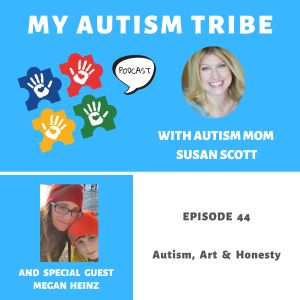
Monday Nov 25, 2019
Autism, Art & Honesty
Monday Nov 25, 2019
Monday Nov 25, 2019
EPISODE 44: AUTISM, ART & HONESTY
INTRO:
Hey, everyone! Thanks so much for joining me today. I’m speaking with Megan Heinz, an autism mom who has been dedicated and passionate about creating accepting and inclusive environments for her son on the spectrum. She’s also gonna share a super cool way that she has been able to connect with her son through art.
And, also a reminder, if you’re enjoying this podcast, please rate and review us wherever you listen to podcasts, and share with a friend. That’s how we make our voice stronger. Thanks for listening!
SEGMENT:
I first connected with Megan Heinz on her Instagram page entitled “Above Typical”; a page that she created to inspire others and connect through autism, art and honesty. A place to laugh and to learn. She shares the real, un-sugarcoated everyday life of her family, and I love how she has taken a somewhat unique approach in bonding with her son through art. I can’t wait for her to share her story on how she fell into this. Please welcome this episode’s amazing guest, Megan Heinz.
CONCLUSION:
Parents have a huge influence over a child’s development and happiness. But this influence can look extremely different from family to family. No textbooks, no manuals, but each family trying to figure out how to best parent their child that has come into this world with their own temperaments, their own personalities, and their own strengths and weaknesses. We teach our children, and they teach us. That’s what is so awesome! To everyone out there putting forth what I know to be an amazing effort to support our children, thank you. Keep up the great work, and thanks for being a part of My Autism Tribe. See ya next week!
ADDITIONAL INFORMATION:
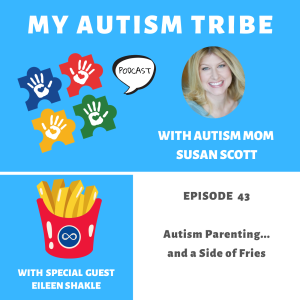
Monday Nov 18, 2019
Autism Parenting...and a Side of Fries
Monday Nov 18, 2019
Monday Nov 18, 2019
EPISODE 43: AUTISM PARENTING…AND A SIDE OF FRIES
INTRO:
Hello, my fellow tribe members! Thanks for joining me today. I’m gonna start right off and say this week’s episode is gonna to make you laugh your socks off. Today, I’m speaking with Eileen Shaklee, also known as “Mama Fry” to all her blog followers. She’s the proud mom of a teenage son with autism, and shares with us how humor (and a side of fries) has helped her family in everyday life.
And if you’re enjoying this podcast, please rate and review us wherever you listen to podcasts, and share with a friend. That’s how we make our voice stronger. Thank you so much for listening!
SEGMENT:
Autism can be isolating at times. There are great days, and then the not-so-great days that leave us scratching our heads and questioning if we’re doing enough…if we ARE enough. But one thing that I believe is super important is finding the humor in all of it. Sometimes it’s difficult to laugh when everything around you is hitting the fan and causing what feels like mass destruction…but you CAN. Eileen Shakle started a blog several years ago as an outlet to connect with others that were experiencing the same things, and people…she’s FUNNY. I love her viewpoint on everyday life, and I know that you will, too. Please welcome, Eileen Shaklee…or as many know her…”Mama Fry”.
CONCLUSION:
Don’t get stuck in the trenches. Sure, it’s important to experience emotions, vent frustrations, but take the time to find goodness every day. Those little things that you can laugh about…maybe it’s at a later time rather than in the moment…but those things or people that will make you chuckle. Life’s too short to stand under a rain cloud all the time. Find the sunshine. Thanks for being a part of My Autism Tribe, and I’ll see ya next week!
COOL ANNOUNCEMENT: My Autism Tribe has been recognized in the "Global Top 20" autism podcasts on Feedspot! https://blog.feedspot.com/autism_podcasts/
ADDITIONAL INFORMATION:
www.autismwithasideoffries.blogspot.com
https://www.facebook.com/AutismWithASideOfFries/
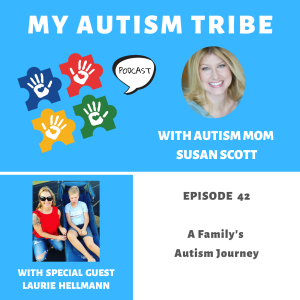
Wednesday Nov 13, 2019
A Family's Autism Journey
Wednesday Nov 13, 2019
Wednesday Nov 13, 2019
EPISODE 42: A FAMILY’S AUTISM JOURNEY
INTRO:
Hi, there! Thanks for joining me. Today, I’m speaking with Laurie Hellmann. She hales from Indiana, and is a proud autism warrior mom who recently wrote a memoir documenting the journey her family has been on since her 16 - year old son, Skyler, was diagnosed with autism in 2006. I’m so happy to have met yet another powerful advocate, and I hope that you enjoy listening.
And you’re enjoying this podcast, we kindly request that you rate and review us wherever you listen to podcasts, and share with a friend. That’s how we make our voice stronger. Thanks for listening!
Today’s podcast is brought to you by Audible – get a FREE audiobook download and 30 day free trial at www.audibletrial.com/MyAutismTribe. Over 180,000 titles to choose from for your iPhone, Android, Kindle or mp3 player.
SEGMENT:
Laurie Hellmann has spent the last 14 years fiercely navigating through therapies, medications and countless other medical and personal challenges with her son, all while continuing to fight for and be the voice for other families with a loved one on the autism spectrum. She also has a 14-year old neurotypical daughter who is just now starting to express that being a sibling of autism is not for the weak because it means that every day is a whirlwind and you never know what to expect.
Most recently, Laurie started a podcast called “Living the Sky Life” to further document and bring a voice to the often-unspoken struggles that families with special needs children, and specifically teenagers, face day to day. Let’s welcome Laurie!
CONCLUSION:
The roles of advocacy can have many forms, but all are important. There are those of us who are talkers, those of us who are the silent giants working magic behind the scenes, but all of us who spend countless hours advocating for those we love – and some we have yet to meet. I’m so proud of each and every one of you, for your dedication, for your heart, and for your support. Thanks for being a part of My Autism Tribe, and I’ll see ya next week!
ADDITIONAL INFORMATION:
Facebook: https://www.facebook.com/livingtheskylifeautismjourney
Instagram: https://www.instagram.com/living_the_skylife_autismtrip
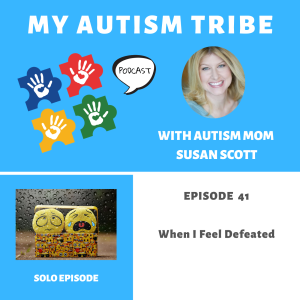
Monday Nov 04, 2019
When I Feel Defeated
Monday Nov 04, 2019
Monday Nov 04, 2019
EPISODE 41: WHEN I FEEL DEFEATED
INTRO:
Hello there! Today, is a solo episode. Just me, talking about my feelings of defeat. We’ve all been there, am I right? Maybe you’re there right now, listening and thinking, “is this going to be another person telling me how to not feel defeated, giving me a checklist on ways cope?” Nope. None of those. I’m just here sharing my feelings on defeat, and offering my recent viewpoint on this feeling.
And if, by chance, you feel like you’ve connected in some way on what I’m sharing, I’d love for you to take one minute to rate and review this podcast. Maybe even share it with a friend. This podcast is one way that we make our voices stronger, and to connect with those that are traveling alongside us in our crazy journey of parenting. Thanks for listening.
SEGMENT:
Let’s face it, parenting is tough stuff. You can go into any bookstore or newsstand and peruse hundreds of books and magazines with “Tips on How to Be an Exemplary Parent”. Try Googling “parenting”. Have you ever tried this? Just type “parenting”. You’ll be introduced to millions of articles, studies, Amazon links, parenting blogs, you name it – everyone is trying to figure it out. Professionals are telling you the parenting style that creates the most well-adjusted children, and I even read an article recently that said for better or worse, parenting changes your child’s DNA. Think about that. It’s no wonder that we have feelings of defeat Every. Single. Day. And let’s talk about Pinterest. Have any of you tried to make these elaborate birthday cakes that have a simple 5 Steps to a Magical Creation, only to have your child ask what it is that you just created? Raise your hand…you know who you are, and I’m included.
Granted, there are days when I say to myself, and even out loud with a pat on my back, “Susan, you know what? You’re not a terrible mom. You are a downright ok-ish mom”. Did you hear that? “Ok-ish”. Why is it that we don’t allow ourselves to say that we are awesome? That we are absolutely slaying this whole parenting thing? Well, let’s talk about stress and fatigue for a hot second.
Stress and fatigue enter (and sometimes lingers) in our lives when our demands exceed the expectations and resources available to us. And let’s face it, Pinterest has not helped, and as special needs parents, we often struggle to find enough resources available to help us. It’s hard to manage a home with an increasingly amount of clutter building, a list of chores longer than the Great Wall of China, work responsibilities, holiday preparations, school functions. I’ve read blogs and watched TV shows on how to create more organization, like Tidying Up with Marie Kondo (which by the way, is she even real…is someone really THAT organized)? Something that I’ve come to realize…and just recently…is that there is no ONE cookie-cutter approach to all of it. I’m tired of trying to fit in the box that social media and TV shows tell me I need to be in in order to feel like a great mom, a worthy friend, a socially-acceptable human being. Sometimes that box just doesn’t feel right. Plus, our social norms are constantly changing, right? What Hollywood is defining as beautiful and the articles that are telling us what is right will inevitably change. For example, remember when everyone freaked out years ago trying to eliminate ALL fat from our diets. Everything on the shelves in stores turned to “Fat Free”? Now, it turns out that we actually need fat in our diets – the healthy kind, of course. I challenge you to go down that Google rabbit hole.
I tell my son all the time that we are all different, and differences aren’t bad, but beautiful. So why can’t I take these words and apply them to my own life? Why is it that I keep coming back to these socially-created definitions of perfection? It always leads me to the same abandoned house, filled with feelings of defeat. I’m so tired of it. I’m tired of even acting like I have all my stuff together…because I don’t. And I’m not afraid of admitting that to ANYONE. Maybe this is what it’s going to take to change my mindset…like a detour from the path I’ve been traveling. There will be days that are easier, and then there will be days where I feel absolutely freaked out because it’s hard, hard, hard work shaping another human being, my child, my heart, the very reason, in fact, that I feel like most days I’m still breathing.
So, let me take a look at another way of viewing the stress and feelings of defeat. What if, the whole parenting thing is not just about shaping my child, but shaping me as well? That I’m actually becoming a better woman, a better parent, just by being a parent and the challenges (and celebration) it gives. I can’t tell you the number of times that I’ve given a stink eye to someone who told me “what doesn’t kill you makes you stronger”. No one wants to hear that from someone else, but maybe I can tell myself that. The stretching and growing from parenting is actually a great thing. It’s a gift, a blessing, that my home needs me.
Let’s look at defeat as power. I think about the times, when I was a child, and even as an adult, where I failed. It did build strength. It did build character, and almost a stubbornness to overcome – to succeed and win. I come from a long line of STRONG women – women that didn’t take “no” for an answer, trail blazers in their time. They weren’t strong because they never failed. They became strong because they experienced defeat, more times, I’m sure, than they admitted. I’m woven from their cloth – a piece of their patchwork quilt.
Most of us cling to the idea that skill comes naturally. We’re born with it. Either we’re good, or not good, at something. Well, that’s simply not true. Even people that are born gifted have to work hard to hone their ability. We’re not born as parents. We have parents when we are born. These trials we experience are honing our ability to become better.
CONCLUSION:
So, let’s all take the time to lift each other up, to give each other high fives, to smile as we’re passing by that person in the grocery store. We all have feelings of defeat, and we’re just honing our ability to become better. For ourselves and for each other.
Thanks for taking the time to listen, and for being a part of My Autism Tribe. You all are very much appreciated. See ya next week!
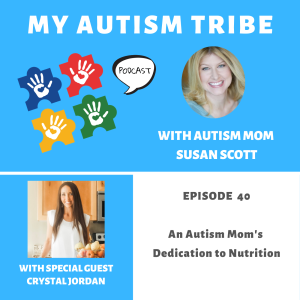
Monday Oct 28, 2019
An Autism Mom's Dedication to Nutrition
Monday Oct 28, 2019
Monday Oct 28, 2019
EPISODE 40: AN AUTISM MOM’S DEDICATION TO NUTRITION
With Autism Mom Crystal Jordan of “Foods Four Thought”
INTRODUCTION:
Hey, everyone! Thanks for joining me today. Today we’re speaking with Crystal Jordan. She’s the proud mother of an amazing son on the autism spectrum, and she has been working tirelessly on something pretty cool that has provided her son with awesome results. She’s a dedicated mama!
Also remember, if you’re enjoying our podcast, if you could take some time to rate and review us wherever you listen to podcasts, and share it with a friend. That’s how we make our voices stronger. You can also find us as My Autism Tribe on Facebook, Instagram, Twitter, and YouTube. And as always, thank you so much for listening!
SEGMENT:
Most of us have been in those states of desperation, and likely many of us are still there, where we are working on the perfect formulas of therapies, supplements, and diets that will work for our loved one on the spectrum. Asking ourselves, “What if we do this therapy, with this vitamin, and eliminate this from their diet? What if we skip this therapy, but go to this doctor?” I literally have binders of information and spread sheets that I’ve collected in our short 3-1/2 years on this autism journey. Some may have viewed it as an obsession, but I don’t think so. I view it as dedication – to make sure my son has the best there is so that he can reach his full potential. I view it as LOVE. Today’s guest is Crystal Jordan. Her passion to provide help for her son is inspiring, and I can totally relate to the love she feels for her little one. Please welcome Crystal Jordan.
CONCLUSION:
Sometimes those states of desperation can provide us with information or insight into what our children or loved ones need. It takes time, dedication, and patience but it’s all so worth it. Never stop trying, always have hope, and dig deep. I believe in everyone – keep up the great work and thanks for being a part of My Autism Tribe. I’ll see ya next week!
ADDITIONAL INFORMATION:
https://www.foodsfourthought.com
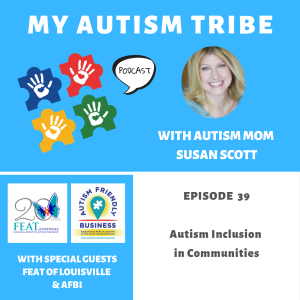
Monday Oct 21, 2019
Autism-Friendly Businesses
Monday Oct 21, 2019
Monday Oct 21, 2019
EPISODE 39: AUTISM FRIENDLY BUSINESSES
w/ guests Melanie West and Monica Cooper with FEAT of Louisville
INTRODUCTION:
Hey, everybody! Thanks for joining me today. We’re speaking with Melanie West and Monica Cooper – both of an organization called FEAT of Louisville and the initiative of Autism Friendly Business in the state of Kentucky. They’re doing some really cool things, so stay tuned.
And remember, if you’re enjoying our podcast, please rate and review us wherever you listen to podcasts, and share with a friend. That’s how we make our voice stronger. Thanks so much for listening!
SEGMENT:
FEAT of Louisville, FEAT being an acronym for “Families for Effective Autism Treatment” is a non-profit organization that actively supports and funds autism programs for the entire family. Created for families by families, FEAT of Louisville is dedicated to easing the autism journey through ongoing support, education and programs. FEAT was founded in 1999 by a small group of parents searching for answers to their children’s complex medical and educational needs.
Melanie West joined FEAT in February of 2018 as the Autism Friendly Business Initiative Program Manager, and Monica Cooper is an autism parent that is now serving as the Community Outreach Coordinator. These ladies are powerhouses, and I can’t wait for you to listen of the impact they are making in the autism community.
CONCLUSION:
Organizations like FEAT with program initiatives like Autism Friendly Businesses are doing amazing things for entire communities. It’s our goal to make our communities more inclusive, right? To make people aware and accepting of everyone, right? A huge thanks to FEAT of Louisville for doing such great work, and really changing the tide through their education and support. Keep it up – we’re rooting for you! Thanks again for listening, and for being a part of My Autism Tribe. I’ll see ya next week!
ADDITIONAL INFORMATION ABOUT FEAT, MELANIE, AND MONICA:
www.featoflouisville.org | www.autismfriendlybusiness.com
FEAT Newsletter | Facebook | Instagram
AFBI Facebook | AFBI Instagram
Monica's bio:
My name is Monica Cooper. I am a mom of three boys, Isaac, Ian and Elijah. Isaac and Ian both have Autism. When we received the first diagnosis over 8 years ago my husband and I were not sure what to do or where to go for help. A friend told us about FEAT and the programs and support that they offered. We immediately decided to get involved. At first this was a slow process for us because we were still trying to navigate and wrap our minds around what Autism was. Two short years later our next son would receive the same diagnosis. This hit us pretty hard and we soon discovered we needed to get off of our “island” and needed to surround ourselves with other families just like us that were all on the same journey. FEAT allowed us to take our children swimming, to the Science Center to the park and even participate in our local ST. Patty’s Day Parade in a fun, yet safe environment. My children have been able to go out into the community and feel loved and accepted by other families. FEAT has not only given my family a sense of belonging, but it has ignited a passion within me to help bring others families that have children with Autism together. The families that are a part of FEAT have become an extended family to me. I want to give families the same HOPE, that was given to me.
Melanie's Bio:
Melanie earned her B.A. in Communications from the University of Louisville. After a career in the banking industry with Fifth Third Bank and JP Morgan Chase she took a different career path to become the CEO of her family. Melanie continued to be involved in the community volunteering at Dunn Elementary and actively serving on their PTA Board. Being a Louisville native, she is passionate about this city and directly impacting families.
The West family has been part of the FEAT movement for years, volunteering and participating in the 5K and FEAT Galas. Melanie joined FEAT of Louisville in February 2018 becoming the Autism Friendly Business Initiative Program Manager. “I am truly passionate about engaging and partnering with local businesses to bring Awareness, Acceptance, and Appreciation for the vast Autism Community.”
In her free time, Melanie enjoys spending time with her family, cooking, B.You Fitness, hiking, dancing, skiiing, traveling, the beach, and an active member of Northeast Christian Church. Melanie is married to the love of her life Mark and has two children.
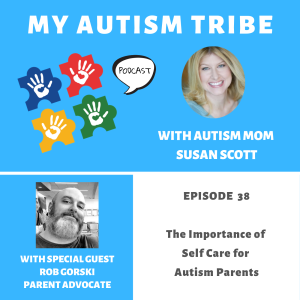
Monday Oct 14, 2019
The Importance of Self Care for Autism Parents
Monday Oct 14, 2019
Monday Oct 14, 2019
EPISODE 38: ROB GORSKI (The Autism Dad)
“The Importance of Self Care for Autism Parents”
INTRODUCTION:
Hey, everybody! Thanks for taking the time to join me today. We’re speaking with Rob Gorski – an autism dad with a strong voice in the autism community. Over the years, he’s amassed upwards of one hundred million views on his blog, and has received tons of awards for both writing and his work in the autism community.
And remember, if you’re enjoying our podcast, please rate and review us wherever you listen to podcasts, and share with a friend. That’s how we make our voice stronger. Thanks for listening!
Today’s podcast is brought to you by Audible – get a FREE audiobook download and 30 day free trial at www.audibletrial.com/MyAutismTribe. Over 180,000 titles to choose from for your iPhone, Android, Kindle or mp3 player.
SEGMENT:
Today’s guest, Rob Gorski, is the proud dad of three amazing children on the autism spectrum. He began a blog in 2010 as a means of coping with everything that was going on – the raw emotions, true happiness and heartbreak. He’s brutally honest, which I absolutely love. His mission to show others of similar circumstance that they are not alone is definitely something that I can connect with, as most of us would agree. We want to make a difference. We want the best for our children. We want the whole world to know just how much compassion we have for the autism community. It can be exhausting though…leaving us questioning how to take care of ourselves, too. What does self-care look like, and what can we do about it? Please welcome, my friend Rob Gorski.
CONCLUSION:
We all experience exhaustion, feelings of being defeated, not good enough. That’s why self-care is so important. Those who have experienced compassion fatigue describe it as being sucked into a downward spiral, not knowing how to stop it, so they do what they’ve always done…continue to give and give and give until they’re completely tapped out. Our families need us to be playing our A-game. We need to take time to fully recharge. I’m making a commitment to everyone here to take better care of myself, so that I can be even better for my son. I challenge you to do the same. It’s not selfish to take care of ourselves. It is needed. I expect everyone here to hold me accountable, and I’ll be here rooting for you. Thank you so much for being a part of My Autism Tribe. I’ll see ya next week!
CONNECT WITH ROB:
https://www.facebook.com/robgorski78
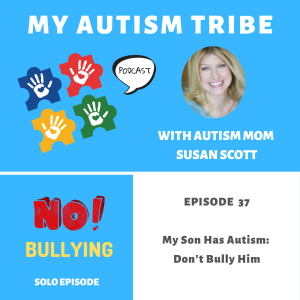
Monday Oct 07, 2019
My Child Has Autism: Do Not Bully Him
Monday Oct 07, 2019
Monday Oct 07, 2019
EPISODE 37: “MY SON HAS AUTISM: DO NOT BULLY HIM”
INTRODUCTION:
Hi, Friends! Thanks for joining me today. It’s just me. October is National Bullying Prevention month, so I thought I would do a segment specifically on my thoughts on this subject, and some of our recent experiences. Since my son started Kindergarten this fall, a subject that I’ve been especially interested in on our journey has been bullying. As a parent with a child on the spectrum, it’s been on my mind a lot. Stay tuned for some of my thoughts, along with some advice that I’ve heard and read about.
If you’re enjoying our podcast, please rate and review us wherever you listen to podcasts, and share with a friend. That’s how we make our voice stronger. Thanks for listening!
Today’s podcast is brought to you by Audible – get a FREE audiobook download and 30 day free trial at www.audibletrial.com/MyAutismTribe. Over 180,000 titles to choose from for your iPhone, Android, Kindle or mp3 player.
SEGMENT:
There have been moments when I’m with my son where I have witnessed (and intervened) on other children…and sadly some adults…bullying him. It absolutely rips my heart out and shakes me to my core. Thankfully, in those moments, I’ve been with him…so then my thoughts turn to “What if I hadn’t been with him? What would have happened? Would he have stood up for himself, or would someone else have intervened?” We can’t be with our children every minute of every day, and we all know that words (good and bad) can be carried with someone their entire life. Of course, bullying doesn’t just happen to individuals on the spectrum, it doesn’t just happen to children…but what can we do about it?
Let’s first start with the very definition of “bullying”. I’m talking about the Webster’s definition. To bully someone means: seek to harm, intimidate, or coerce (someone perceived as vulnerable). The facts tell us that children with disabilities are much more likely to be bullied than their nondisabled peers. When looking within a school setting, one study shows that 60 percent of students with disabilities report being bullied regularly compared with 25 percent of all students. As parents and caregivers, we have a right to ensure that the school our child attends provides a framework of protection. All children have a right to receive a free appropriate public education (FAPE) in the least restrictive environment and free from disability-based harassment.
Personally, I can remember (middle school primarily…because, let’s be honest, those are tough years for any child) when I was bullied. I was backwardly shy, glasses, braces, a bad perm, good student…you name it…I was the poster child that screamed “nerd”. I got made fun of…and I cried…sometimes in a school bathroom stall, in the gym locker room, at home. It sometimes made school not so fun. I carried a lot of that with me for a long time, and though I know I can’t protect my son from all of the nastiness that life can bring, I do want to make sure that I equip him (and others) on handling situations like this.
Bullying, I used to believe, used to mean meeting someone on the playground and beating them up, or stealing someone’s lunch. As I’ve grown older and have become more educated and aware, I’ve recognized there are many complexities and various forms of bullying. Bullying not only includes direct contact or physical assault, it can be milder and more indirect: social exclusion, subtle insults, teasing, and the spreading of rumors. Laughter at another person’s expense is a form of bullying. And now that most individuals have online access, we have issues with cyberbullying. I have to admit, I’m so glad that social media wasn’t around when I was growing up.
At my son’s school, they have a couple of apps they use to update families on special events, reminders, updates on their child, pictures from their day. They’re really awesome, and my son’s teachers do an incredible job of keeping the lines of communication open. Alex seems to be really happy at school. But one day recently, a video was posted on one of these apps that showed the entire class singing a song they had learned. I was watching it with Alex, and was commenting on how sweet and special this video was. It was then that he pointed to a specific girl in his class. Now, please note that Alex is now verbal, but can still very much struggle with piecing together sentence structures, especially when it comes to more (as I say) colorful language. He points at this girl and says, “She squeezed my arm and called me stupid.” I immediately replayed the video, and again he pointed to the same girl and said the same thing. I froze. This was the first real conversation that I had had with Alex about bullying. We’ve talked a lot about self-advocating, saying “stop” when he doesn’t want something, but we hadn’t (before this time) talked specifically about hurtful words that people can say. I asked him what he did, not sure if he was going to be able to describe it. He said that he told his teacher. I told him that was exactly what he was supposed to do. I told him that her words were wrong, that he wasn’t stupid – that he was, in fact, very smart. I now have an open dialogue with his teacher, and we are both working on dialogue with Alex. His teacher did respond appropriately when Alex told her, so we’re on a good path, but my thoughts still go back to, “What if she hadn’t? What if Alex wasn’t able to tell her?” I still have a fear, but I can now rest a little easier knowing that it was handled (this time) appropriately. The adult response is so very important, and it’s important that adults know how to talk with someone in a bullying situation. I’m not sure that I handled it exactly right, as I’m still learning, but the child should know that it is never their responsibility to fix a bullying situation. They should seek the help of an adult, and I’m beyond proud that Alex did just this.
You see, Alex loves to learn. He loves school, and I know in a great environment he thrives, but research has shown that bullying can negatively impact a child’s access to education and can lead to:
-School avoidance and higher rates of absenteeism
-Decrease in grades
- Inability to concentrate
- Loss of interest in academic achievement and an
- Increase in dropout rates
Students with disabilities have legal rights when they are a target of bullying, and most states even have laws that address bullying – specifically to students with disabilities. School districts can have individual policies that address how to respond to bullying situations. In our case, we were provided a packet of information from our local district on their policy on bullying. If you’re not sure, contact them and request a written copy.
Most of you are probably familiar, if your child is in school, on IEPs (Individualized Education Program). Students with disabilities, who are eligible for special education under the Individuals with Disabilities Education Act (IDEA) will have one of these. The IEP can be a helpful tool in a bullying prevention plan, and if bullying is becoming an obstacle to a child’s education, then it can be incorporated into their IEP. There could be goals for social skills, speech and language skills, and self-advocacy skills written in the IEP so they know how to address a bullying situation. There is a woman by the name of Dr. Michelle Borba that has even designed a prevention approach that she has labeled CALM. It’s an acronym, C-A-L-M, of simple rules that can be taught to students with autism:
-The first step in the CALM approach, the “C”, is to “Cool Down”. Teach your child to recognize stress signals like sweaty hands, rapid heartbeat) and learn calming strategies like deep breathing.
- The second step, the “A”, is to “Assert Yourself”. Part of the social skills curriculum can be teaching assertive body language. This doesn’t mean to start throwing punches. Role playing and video modeling can assist in teaching non-verbal body language that can deflect bullying attempts.
- The third step, the “L”, is to “Look Them in the Eye”. Eye contact can be challenging for some students with autism, but using visual supports can be beneficial in teaching eye contact during a bullying attempt.
- The last step in the CALM approach, the “M” is “Mean It”. Language scripts can be taught such as “stop that”, “leave me alone”, or “get away from me”.
But maybe the most important thing in all of this discussion about bullying, is having your child know they are loved. We all have bad days. We have all been bullied, and they are not alone. I know, at least from my own personal experience, that we often believe we are the only one this is happening to, and that no one else cares. That couldn’t be further from the truth. It’s not up to one person to end bullying, and there are individuals, entire communities and organizations that care a lot about this very specific subject. No one deserves to be bullied – absolutely no one. All people should be treated with respect, no matter what, and we all have a responsibility to work together on creating positive change. This is not about, “If I have time, I will”, “If it’s my child, I will”, no. It takes a village. It takes My Autism Tribe. Thank you for being a part of mine, and for walking beside me as I try to make a difference for not only my son, but for others. Much love to everyone. See ya next week!

